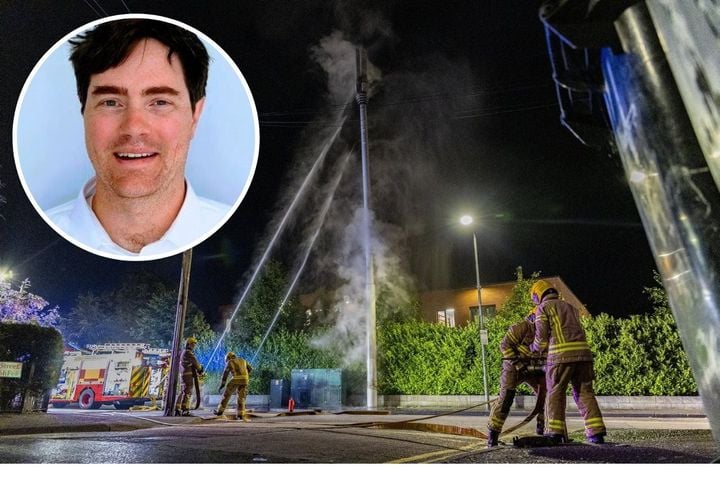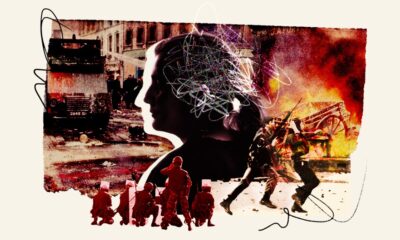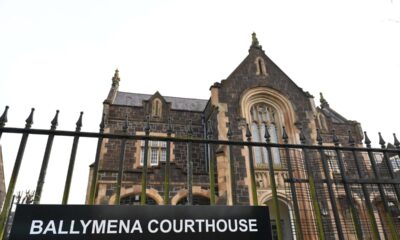Business
Community Concerns Fuel Belfast 5G Mast Attacks, Says Expert

Attacks on 5G masts in Belfast have sparked significant community concern, with local residents fearing surveillance by the state. According to Dr. Tristan Sturm, an academic from Queen’s University Belfast, these incidents may reflect deeper anxieties rooted in the city’s tumultuous history.
In recent months, several 5G towers have been vandalized and set on fire, raising questions about the motivations behind these acts. Dr. Sturm suggests that the attacks are connected to long-standing conspiracy theories that have gained traction in various communities. He emphasizes that the perception of surveillance has become a powerful driver of fear and mistrust, particularly in regions with a history of conflict.
Belfast has a past marked by political strife and division, which may contribute to the heightened sensitivity surrounding the introduction of new technology. The academic points to the broader implications of these fears, suggesting that the community’s troubled history may lead to a quickness to assume the worst about government intentions.
Dr. Sturm highlights that the belief in conspiracies often flourishes in environments where trust in institutions is low. He draws parallels to popular conspiracy theories, referencing the enduring speculation surrounding prominent events such as the assassination of President John F. Kennedy and the circumstances of Jeffrey Epstein‘s death. Both cases illustrate how narratives of deception can resonate deeply with the public, fostering an atmosphere of suspicion.
The 5G technology rollout has been met with skepticism in various parts of the world, with many individuals linking it to health risks and state surveillance. In Belfast, the attacks on infrastructure can be seen as a manifestation of these fears. Dr. Sturm notes that the community’s reaction to the masts could be viewed through the lens of a historical context where technology is associated with oppressive oversight rather than progress.
Furthermore, the academic urges that addressing these concerns requires open dialogue and transparency from authorities. He believes that fostering trust between the community and the government is vital in mitigating fears related to 5G technology. As the debate around the safety and implications of 5G continues, Dr. Sturm’s insights underscore the importance of understanding the cultural and historical factors at play.
In conclusion, the ongoing attacks on 5G masts in Belfast reveal a complex interplay of fear, historical context, and conspiracy theories. As communities grapple with the implications of new technology, experts like Dr. Sturm advocate for a nuanced understanding of these issues, highlighting the need for constructive conversations to alleviate public anxiety.
-

 World4 days ago
World4 days agoCoronation Street’s Shocking Murder Twist Reveals Family Secrets
-

 Entertainment4 months ago
Entertainment4 months agoKate Garraway Sells £2 Million Home Amid Financial Struggles
-

 Entertainment3 months ago
Entertainment3 months agoAnn Ming Reflects on ITV’s ‘I Fought the Law’ Drama
-

 Health3 months ago
Health3 months agoKatie Price Faces New Health Concerns After Cancer Symptoms Resurface
-

 Entertainment4 weeks ago
Entertainment4 weeks agoCoronation Street Fans React as Todd Faces Heartbreaking Choice
-

 World4 weeks ago
World4 weeks agoBailey Announces Heartbreaking Split from Rebecca After Reunion
-

 Entertainment7 days ago
Entertainment7 days agoTwo Stars Evicted from I’m A Celebrity Just Days Before Finale
-

 World7 days ago
World7 days agoKevin Sinfield Exceeds Fundraising Goal Ahead of Final Marathons
-

 Entertainment3 months ago
Entertainment3 months agoCoronation Street’s Carl Webster Faces Trouble with New Affairs
-

 Entertainment3 months ago
Entertainment3 months agoWhere is Tinder Swindler Simon Leviev? Latest Updates Revealed
-

 Entertainment4 months ago
Entertainment4 months agoMarkiplier Addresses AI Controversy During Livestream Response
-

 Science2 months ago
Science2 months agoBrian Cox Addresses Claims of Alien Probe in 3I/ATLAS Discovery





















